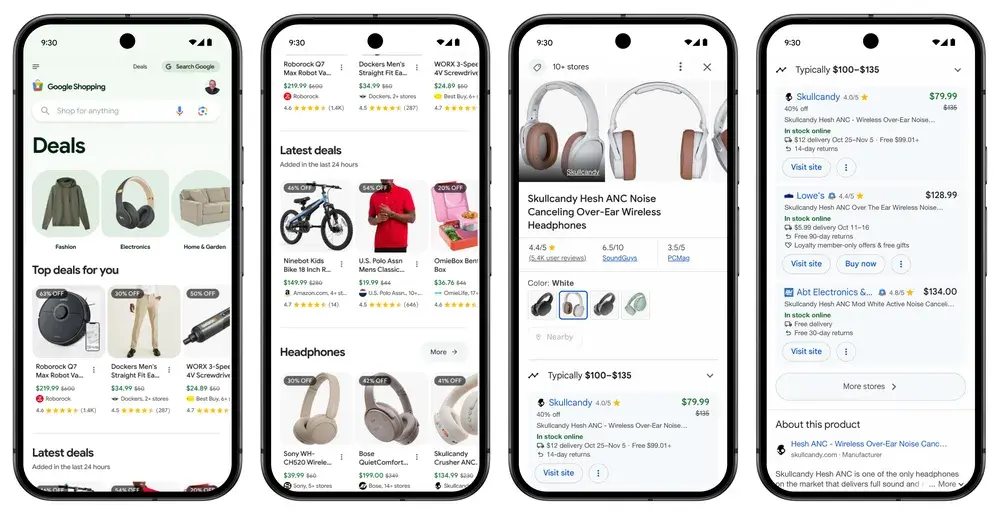Google has made significant strides in enhancing its shopping experience with AI, unveiling new features in October 2024 designed to improve product discovery, personalization, and user engagement. This update leverages advanced artificial intelligence to create a more intuitive and streamlined shopping experience, offering consumers better product recommendations and search results.
For digital marketers, especially those in the Middle East’s rapidly growing e-commerce sector, this AI-driven shift is crucial. As consumer habits evolve and online retail continues to surge in popularity, understanding Google’s latest AI innovations will be key to staying competitive. In this article, we’ll explore how these updates impact e-commerce, what they mean for marketers, and how businesses can benefit from the changes.
What’s New in Google Shopping’s AI Update?
The centerpiece of Google’s October 2024 Shopping update is its improved AI-powered product discovery engine. By analyzing user behavior, preferences, and historical data, Google now offers more personalized shopping experiences. With AI algorithms constantly learning from users, the platform can provide highly relevant product recommendations, helping consumers discover products that match their needs and preferences more effectively.
Additionally, Google’s AI now better understands search queries by employing natural language processing (NLP). This allows for more accurate results when consumers use vague or conversational language in their searches. For example, if a shopper searches for “comfortable shoes for running in hot weather,” Google’s AI is now better equipped to present tailored product options, even if the search terms aren’t directly linked to a product description.
Another key feature is the use of AI to enhance visual product searches. Users can now take photos of items they’re interested in and Google’s AI will help them find similar products from a wide range of retailers. This visual search technology, coupled with AI recommendations, is poised to change the way users interact with e-commerce.

Implications for E-Commerce and Marketers
Google Shopping’s AI update opens up new opportunities for retailers and marketers to capture consumer interest. By offering more personalized and targeted results, brands can connect with potential customers in a more meaningful way. For e-commerce businesses operating in the Middle East, where mobile-first shopping and personalization are growing trends, these changes can significantly enhance the customer experience.
According to research, the Middle East’s e-commerce market is expected to grow at a rate of 16.9% by 2027, with Saudi Arabia and the UAE leading this transformation. With consumers increasingly relying on digital platforms to browse and shop, integrating AI-powered tools like those in Google Shopping is a logical step for retailers looking to optimize their presence.
Brands can also benefit from improved ad targeting as the AI engine fine-tunes product recommendations. Marketers can ensure their products appear in front of the right audience at the right time by leveraging Google’s enhanced algorithms. This is particularly valuable for regional businesses trying to compete with global retailers, as the AI helps narrow the gap by making their offerings more visible to consumers.
Real-World Use Cases
Let’s consider a scenario where an e-commerce brand in Dubai specializes in selling fitness apparel. With the updated AI features, a potential customer searching for “breathable running gear” is now more likely to be presented with the brand’s products, even if the search language is less specific. The AI’s ability to understand broader, conversational queries ensures that the brand’s products are positioned in front of users at the moment they are ready to make a purchase.
Similarly, businesses in the luxury sector, such as high-end fashion retailers in Saudi Arabia, can use Google’s visual search functionality to capture customers who are looking for specific styles. For instance, a user taking a photo of a designer handbag they admired on the street could be directed to similar items offered by the retailer.
In both cases, the AI’s deep learning capabilities not only improve product discovery but also lead to higher conversion rates as consumers are offered highly relevant results.
Optimizing for AI-Driven Google Shopping
To take full advantage of Google’s AI-powered Shopping features, marketers should focus on optimizing their product listings with rich, detailed descriptions and high-quality visuals. AI relies heavily on product metadata, so ensuring that titles, descriptions, and attributes are well-structured is essential. Additionally, implementing clear, high-resolution images for visual search functionality can give products a higher chance of appearing in relevant searches.
Brands should also consider their broader advertising strategies. With AI playing a larger role in Google’s e-commerce ecosystem, utilizing Google Ads in combination with Shopping campaigns becomes increasingly important. The more data Google’s AI has to work with, the better it can match products with potential buyers.
For businesses operating in the Middle East, adapting to these AI-driven changes offers a way to stay competitive in a market where digital shopping behaviors are evolving rapidly. By refining their online presence and using AI to target the right audiences, retailers can maximize their visibility and sales potential.
For more tips and a deeper understanding, don’t miss our E-Commerce Fix: Google Analytics Tackles Hidden Product Listings for additional insights.
Key Takeaway for Marketing Managers
For marketing professionals in the Middle East, Google’s latest AI update in Shopping presents an opportunity to elevate their e-commerce strategies. By enhancing product discovery through personalized recommendations, visual search, and natural language processing, Google is setting a new standard for how consumers find products online.
Marketing managers should focus on ensuring that their product data is well-optimized for AI, with detailed descriptions and visuals that can enhance searchability. Additionally, integrating Google Ads with Shopping campaigns will allow for better targeting and increased visibility across the platform.
As the Middle East continues its rapid digital transformation, marketers who adapt to AI-powered tools will be better positioned to capture a growing online consumer base. Google Shopping’s AI update is a step forward in e-commerce, and marketers should consider how to incorporate these advancements into their strategies to stay ahead in the competitive digital landscape.



